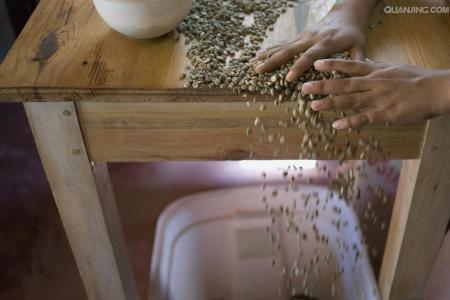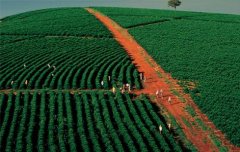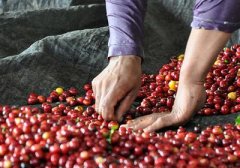A brief introduction to the History and Culture of the Origin and Development of Guatemalan Fine Coffee beans with balanced acidity

Here, the slopes of Sierra Madre volcano provide ideal conditions for growing high-quality coffee beans, and coffee growing at high altitudes is full of vitality. Compared with other kinds of coffee, tasters prefer this mixed flavor coffee with spicy flavor. The extra-hard coffee beans here are a rare good coffee with full grains, delicious taste and balanced acidity. In addition, Guatemala has attracted a lot of attention because of its giant coffee beans.
Antigua is a famous producer of coffee. Antigua coffee is produced in Hacienda Carmona, where the best quality coffee is EL Pulcal, which is not only of good quality, but also has a stronger flavor, richer taste and stronger tobacco flavor than other Guatemalan coffee. Every 30 years or so, the area near Antigua is hit by a volcanic eruption, which provides more nitrogen to the already fertile land, and plenty of rainfall and sunlight make the place more suitable for growing coffee.
Other coffee producers include San Marco, Oriente & Coban, Palcya, Mataquescuintia and La Uman in Sakapa.
Coffee was really introduced into Guatemala in 1750 by Father Jesuit, and the coffee industry was developed by German colonists at the end of the 19th century. Today, most of the coffee industry's production takes place in the south of the country. There are seven major coffee producing areas in Guatemala, and the flavor of coffee produced in each area is different, but to sum up, Guatemalan coffee has a mild and mellow overall texture, elegant aroma and special and pleasant acidity similar to fruit acid. it has become an aristocrat in coffee.
El Salvador's unique high-grade variety Pacamara, Pacamara is a sudden variation of the bourbon species found by Pacas Pacas- in El Salvador and a hybrid with the giant bean Maragogype, a sudden variant of the Tibica species found in Brazil.
The interesting thing about Christmas farm coffee is that its refining method is secret, using mineral-rich hot spring water to process raw coffee beans. This farm is located in fertile volcanic soil and rich in natural hot spring water, so this natural hot spring water is all used in raw bean processing; there are many coffee gardens in the world, but this method is still rare. in the early 1990s, guerrilla warfare greatly damaged the country's national economy, reducing coffee production from 3.5 million bags in the early 1970s to 2.5 million bags in 1990-1991. The eastern part of the country was most affected by guerrilla warfare, and many farmers and workers were forced to leave the manor. The shortage of funds has led to a sharp drop in coffee production, from 1200 kg per hectare in the past to less than 900kg per hectare today. In addition, the government imposed an additional 15% tariff on exported coffee in 1986, that is, an additional 15% in addition to the existing 30% tax. Taxes, together with unfavorable exchange rates, have greatly reduced the export of coffee and the quality of coffee.
The government finally realized the great role of coffee in the national economy, such as solving employment, earning foreign exchange and developing agriculture, and so on, so it privatized some coffee export industries in 1990, hoping to increase the income rate of coffee in the export market. Salvadoran coffee ranks alongside Mexico and Guatemala as producers of Asa and Merdo, and is fighting for the top two places in China and the United States with other countries. The highlands of origin are large coffee beans of all sizes, which are fragrant and mild in taste. Like Guatemala and Costa Rica, coffee in El Salvador is graded according to altitude. The higher the altitude, the better the coffee. It is divided into three grades according to elevation: SHB (strictly high grown) = highlands, HEC (high grown central) = mid-highlands, and CS (central standard) = lowlands. The best brand is Pipil, which is what the Aztec-Mayan (Aztec-Mayan) called coffee, which has been recognized by the American Organic Certification Society (Organic Certified lnstitut eof America).
Guatemalan coffee has a strong aroma, even if you don't drink it, just smelling it is already a pleasure. Antigua coffee has a rich and velvety mellow, rich and lively aroma, and fine sour taste. When the attractive fragrance lingers on the tip of your tongue, there is an indescribable mystery. You may feel dull at the first sip, but as the coffee cools down, you will find it slightly sweet and be surprised by its depth.
Antigua coffee is popular with most coffee lovers only because of its distinctive aroma. Because it is planted in the hills of volcanoes, it can retain its own characteristics more than Costa Rica, the main reason is that it has more geographical and climatic advantages than Costa Rica. Guatemala is located in the tropics, but due to the relatively high altitude, the climate is mild, it is a subtropical climate. Under the influence of this climate, coffee trees blossom and bear fruit more slowly than coffee trees in other parts of the world. However, the mild climate and fertile soil make it an excellent environment for growing coffee.
The coffee industry, run by the Mayans, once boomed the Guatemalan economy and dominated the national economy. Unfortunately, the political situation in Guatemala is not good for these coffee growers. High output is usually a sign of a country's overall economic prosperity. However, coffee production in Guatemala has declined relatively, at 700kg per hectare, compared with 900kg per hectare in El Salvador and 1700 kg per hectare in Costa Rica. Guatemalan coffee exports are controlled by private companies, but the National Coffee Council controls other sectors of the coffee industry.
There are few places in the world that offer a variety of high-quality coffee beans like those produced in Guatemala. The excellent quality of Guatemalan coffee beans is due to the unique conditions of their producing areas, including different climate change in each region, rich soil formed by volcanoes, abundant natural water resources, high-altitude mountains and shady and moist forests.
Guatemala has seven major coffee producing areas: Antigua,Coban,Atitlan,Huehuetenango,Fraijanes,Oriente and San Marcos.
The coffee beans in each producing area have their own characteristics, and they have won a lot of praise for Guatemala in the international community, especially the perfect coordination of the sour, sweet and mellow texture of Antigua; with a touch of smoke and a little more emphasis on its mystery, you will have reason not to look for alternatives everywhere after tasting.
Important Notice :
前街咖啡 FrontStreet Coffee has moved to new addredd:
FrontStreet Coffee Address: 315,Donghua East Road,GuangZhou
Tel:020 38364473
- Prev

A brief introduction to the description of flavor and aroma characteristics of high-quality Guatemalan coffee beans
Antigua coffee is popular with most coffee lovers only because of its distinctive aroma. Because it is planted in the hills of volcanoes, it can retain its own characteristics more than Costa Rica, the main reason is that it has more geographical and climatic advantages than Costa Rica. Guatemala is located in the tropics, but because of its high altitude, Qi
- Next

A brief introduction to the market price of high-quality Guatemalan coffee beans with jasmine fragrance
Other coffee producers in Guatemala, such as San Marco, Oriente Coban, Palcya, Mataquescuintia and La Uman in Sacapa, are mostly cultivated in the high-altitude volcanic soils of the most advanced Arabica (Arabica) varieties. Due to maturity
Related
- Detailed explanation of Jadeite planting Land in Panamanian Jadeite Manor introduction to the grading system of Jadeite competitive bidding, Red bid, Green bid and Rose Summer
- Story of Coffee planting in Brenka region of Costa Rica Stonehenge Manor anaerobic heavy honey treatment of flavor mouth
- What's on the barrel of Blue Mountain Coffee beans?
- Can American coffee also pull flowers? How to use hot American style to pull out a good-looking pattern?
- Can you make a cold extract with coffee beans? What is the right proportion for cold-extracted coffee formula?
- Indonesian PWN Gold Mandrine Coffee Origin Features Flavor How to Chong? Mandolin coffee is American.
- A brief introduction to the flavor characteristics of Brazilian yellow bourbon coffee beans
- What is the effect of different water quality on the flavor of cold-extracted coffee? What kind of water is best for brewing coffee?
- Why do you think of Rose Summer whenever you mention Panamanian coffee?
- Introduction to the characteristics of authentic blue mountain coffee bean producing areas? What is the CIB Coffee Authority in Jamaica?

